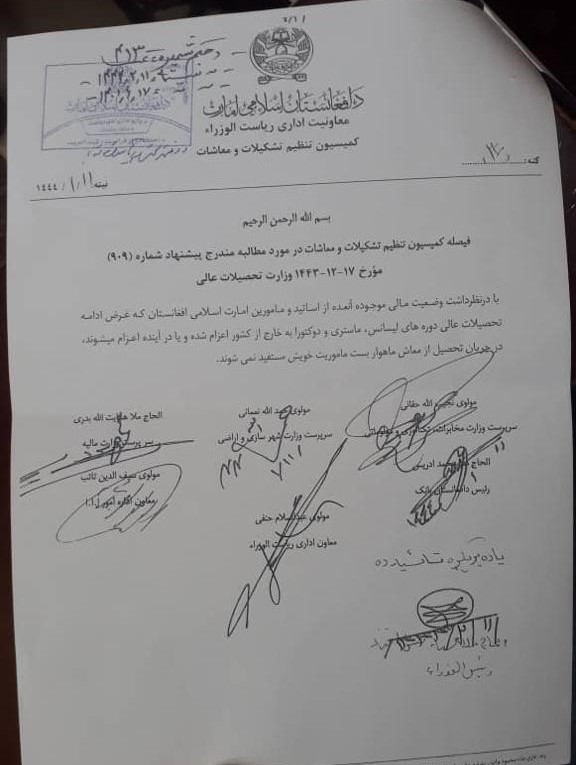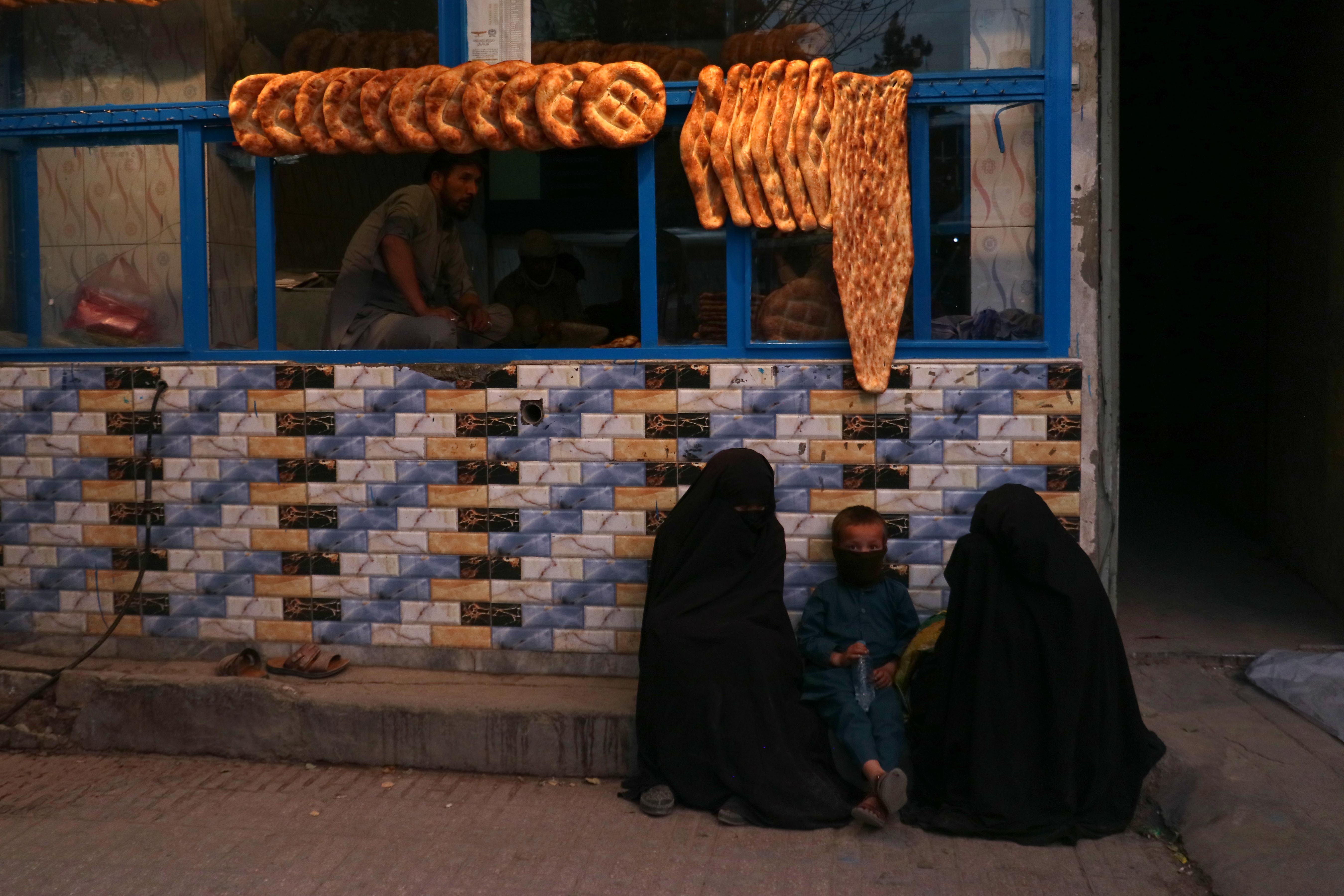Afghan Witness changed the name of the individual interviewed.
Before Afghanistan fell to the Taliban, Maihan worked as a lecturer at a public university. She hoped to further her qualifications abroad and return to Afghanistan to continue her career in higher education.
Six months before the group’s takeover, the mother of three was offered a PhD scholarship in Pakistan. Despite recovering from a C-Section and the birth of her third child, Maihan says she decided to take the scholarship as there were no PhD courses available in her field within Afghanistan.
“Only ten days after my third child was born, I was notified by my respective university that the course had started, and I had to be there,” Maihan tells Afghan Witness (AW). “I still had the C-Section stitches on my body, and with my newborn in my arms, I crossed the Torkham border in a terrible condition.”
“I can never forget those bitter memories,” Maihan adds, fighting back her tears.
The university lecturer tells AW that she sacrificed many opportunities to get the scholarship; she declined several offers of promotion and her husband also resigned from his job so that the family could move to Pakistan.
During their time in Pakistan, Maihan’s salary was the family’s only source of income. However, in July this year, it was reported that the Taliban would cut-off salary payments to professors and civil servants continuing their studies abroad. Maihan says she and over a thousand other university lecturers started to face financial difficulties.
“Unfortunately, to the current regime, knowledge and education has no worth – this is the truth whether we say it or not,” Maihan tells AW.
In Pakistan, Maihan’s husband struggled to find a job. To survive, Maihan – no longer earning – stopped attending university and started to cook and sell Bolani, a traditional Afghan pastry filled with leeks and potatoes.
When they were unable to rely on selling Bolani any longer, the family borrowed money from neighbours so they could return to Afghanistan, where Maihan and her husband hoped to find work.
“Four days after I returned to Afghanistan, I went to the Taliban’s higher education authorities and asked them why they did not pay my salary. They showed me the official letter that they could no longer pay us,” Maihan explains to AW.
In response, Maihan suggested that she officially withdraw from her PhD studies so she could return to work. Instead, she says the Taliban replied that hundreds of academic staff were currently on sabbatical leave, and if everyone leaves their studies, it would defame the Taliban.
 A letter from the Taliban’s Higher Education ministry informing staff studying abroad that they will no longer be paid.
A letter from the Taliban’s Higher Education ministry informing staff studying abroad that they will no longer be paid.
Unemployment and poverty
Maihan, now living in one of Afghanistan’s northern provinces, is struggling to find another job. In January, the UN announced that 500,000 jobs had been lost since the Taliban’s takeover. While her husband works as a taxi driver, Maihan says food prices have skyrocketed and her husband’s earnings are insufficient to make ends meet.
Media have reported that Afghanistan’s universities are facing a lack of qualified staff as dozens have left the country in what experts describe as a “brain drain”. Many academics studying abroad like Maihan have not been paid, and return to Afghanistan only to face further insecurity.
Only days ago, a Takhar University lecturer, who had been on sabbatical leave in Russia, lost his daughter after being unable to pay for her medical treatment. According to media, the Taliban had halted his salary and that of 19 of his fellows.
 Since returning to Afghanistan, Maihan has struggled to find work and says food prices have sky-rocketed.
Since returning to Afghanistan, Maihan has struggled to find work and says food prices have sky-rocketed.
Maihan says that the Taliban have left her with no choice; they are not paying her salary, yet have told her not to withdraw from her studies officially – if she does, she will be fired permanently. She adds that a group of university lecturers have approached the Taliban about their concerns, but have made no progress.
“After returning to Afghanistan, I went to the Ministry of Higher Education. There I was mistreated, despite tightly observing hijab,” Maihan tells AW. “The guards at the ministry did not allow me to sit in the waiting room and told me to wait in the hallway instead, as, according to them, the place wasn’t for women to sit – that hurt me.”
Higher education under the Taliban
AW has been monitoring Afghanistan’s education sector since the Taliban’s return to power. Unlike girls’ high schools, which remain closed for girls above the sixth grade, the country’s main universities reopened in February and women are allowed to study. However, classes are gender segregated and female students must adhere to the Taliban’s rules on ‘hijab’. Naturally, fewer women have returned to their studies since universities reopened.
Maihan says that nothing resembles the past – there are barely ten students in each class and the lecturers feel burnt out as they have to teach female and male students separately in two shifts daily.
“The Taliban have replaced most university chancellors and vice-chancellors with their affiliates who do not have any qualifications,” Maihan adds.
Determined to find a solution to their unpaid salaries, Maihan says she and her colleagues even suggested to the Taliban’s Higher Education ministry that if they can no longer pay the staff, international organisations, such as the UN, should intervene – in the same way that UNICEF has paid public school teachers in Afghanistan. Again, no progress has been made, and this has forced academic staff to take drastic measures, she says.
“A number of the lecturers have left their studies and are now [suffering] harsh labour abroad to earn,” Maihan explains. “Several others, like me, have withdrawn from their studies and returned to Afghanistan to face poverty and uncertainty.”
From being a university lecturer and a PhD candidate, Maihan has been plunged into hardship and insecurity.
“We are going through some of the toughest times of our lives,” she says. “I feel like we have hit the ground hard from the skies.”
Days after our conversation with Maihan, it was reported that the Taliban’s Higher Education ministry had revised their decision regarding the salaries of academic staff studying abroad and decided the salaries would be reinstated.
AW contacted Maihan to see if there had been any changes to her situation.
“It is not accurate and it is a rumour,” she replied. “They may have said such a thing just to silence lecturers who had a gathering at the Ministry of Higher Education recently.”


